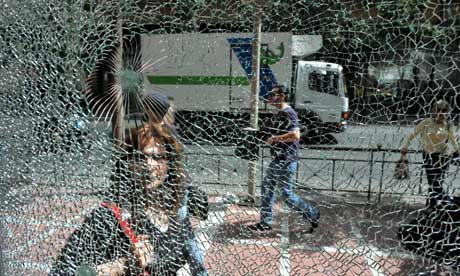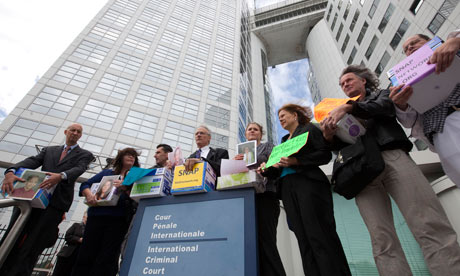 |
| 'In two crucial aspects things are the same now for young people on deprived estates as they were in 1975: the visceral hatred of the police and the sense of having nothing to look forward to and nothing to lose.' Photograph: Nikolas Giakoumidis/AP |
The question of whether the recent riots represent political protest or simple criminal behaviour is not new. Thirty-six years ago, on the evening of 28 September 1975, the same debate arose over what became known as the Spaghetti House siege.
Three armed young black men held up the Knightsbridge branch of the Spaghetti House restaurant chain in London. Within minutes police were on the scene and the young men, unable to escape, bundled staff into a storeroom. The "gunmen" claimed to represent the Black Liberation Army. For five days the police negotiated with them to release the hostages unharmed, which they ultimately did.
The incident – more Oakland, California, than South Kensington – took the UK by surprise; the police, aided by the media, were quick to label it a robbery gone wrong. Hard man Sir Robert Mark, then Met chief, said there was "no racial or political connotation" in the crime as 400 officers were deployed, Knightsbridge was closed to all traffic and false information was broadcast to confuse those glued to a radio in the storeroom.
Dangerous robbers or political activists? "The line between politics and crime", wrote Ambalavaner Sivanandan, "is a thin one in a structurally racist society". For many young black people at that time on the margins of education, work and family life, everything was about hustling. Hustling was making money wherever you could. Whether that money went to fund you personally or to fund "the movement" was a close call. The young people in the ranks of the black political groups lived their politics; it was what they read, what they wore, the demos they went on at weekends, the community schemes they contributed to, the confrontations at night. And there was also a strong school of thought that so much had been stolen from black people through slavery, that it was now their right to claim some back.
Of the three in the siege, Franklin Davies had already served a sentence for armed robbery, but had also tried to enlist in the armed struggle against colonialism in southern Africa. Anthony (Bonsu) Munroe, a would-be medical student, ran a supplementary school for black children (then being relegated to schools for the "educationally subnormal"). Wesley Dick had been in Ashford remand centre and had a series of petty convictions such as stealing a book from Foyles and kicking a can in the street. But he had also attended the Sixth Pan-African Congress in Tanzania in 1974 and worked as a volunteer at the Institute of Race Relations. The latter two had variously been members, or attended meetings, of the London-based Black Panther movement, Fasimbas, the Black Liberation Front and the Black Unity and Freedom party.
Key radical groups within the black community, conscious of the "thin line" hurriedly met to decide how to forestall a potential police shootout. Some felt that the three had just wanted easy money and supporting them would give black politics a bad name. But far more realised that it was not the time to forsake them. They issued a statement that attempted to give background and explain the actions of "the brothers".
The three used their trial as a form of protest. They turned their backs on the judge, held up a poster and were sent down to the cells for the duration of the trial. They came back for verdict and sentence, when they tried to read a statement to the court and gathered press. And they got political sentences – of 17, 18 and 21 years – just as the recent rioters have received political sentences.
Today the circumstances are different. The sustaining culture of Black Power is long gone, the idea of reparations belongs to academia rather than the street. The welfare state has given way to the market state, and communities, as the riots showed, are now much more multicultural. But in two crucial aspects things are the same for young people on deprived estates: the visceral hatred of the police and the sense of having nothing to look forward to and nothing to lose. It is unexplained deaths at the hands of the police, such as those of Smiley Culture and Mark Duggan, that act as a catalyst for action.
Among the rioters there were certainly opportunists and looters. But there was, equally, a section of young people who, in interview after interview, expressed a political rage – about the way cuts affected communities, about having no route to social or economic mobility, about the way City fat cats had created a crisis for which the poor had to pay. Theirs was the violence of the violated.
• Jenny Bourne has written a fuller account, "Spaghetti House siege: making the rhetoric real" in Race & Class, October 2011
By: Jenny Bourne
Jenny Bourne is editor of the journal Race & Class










